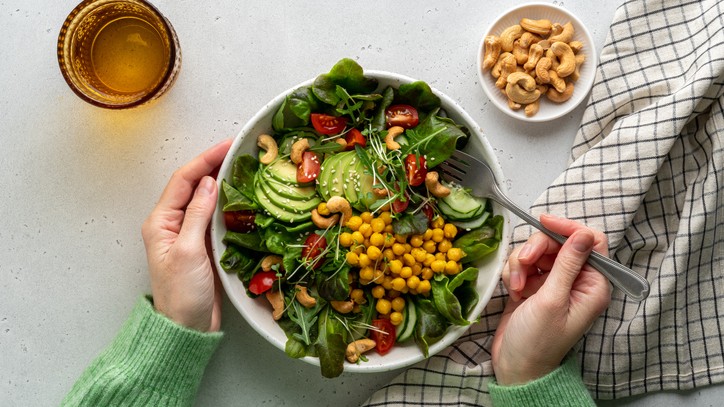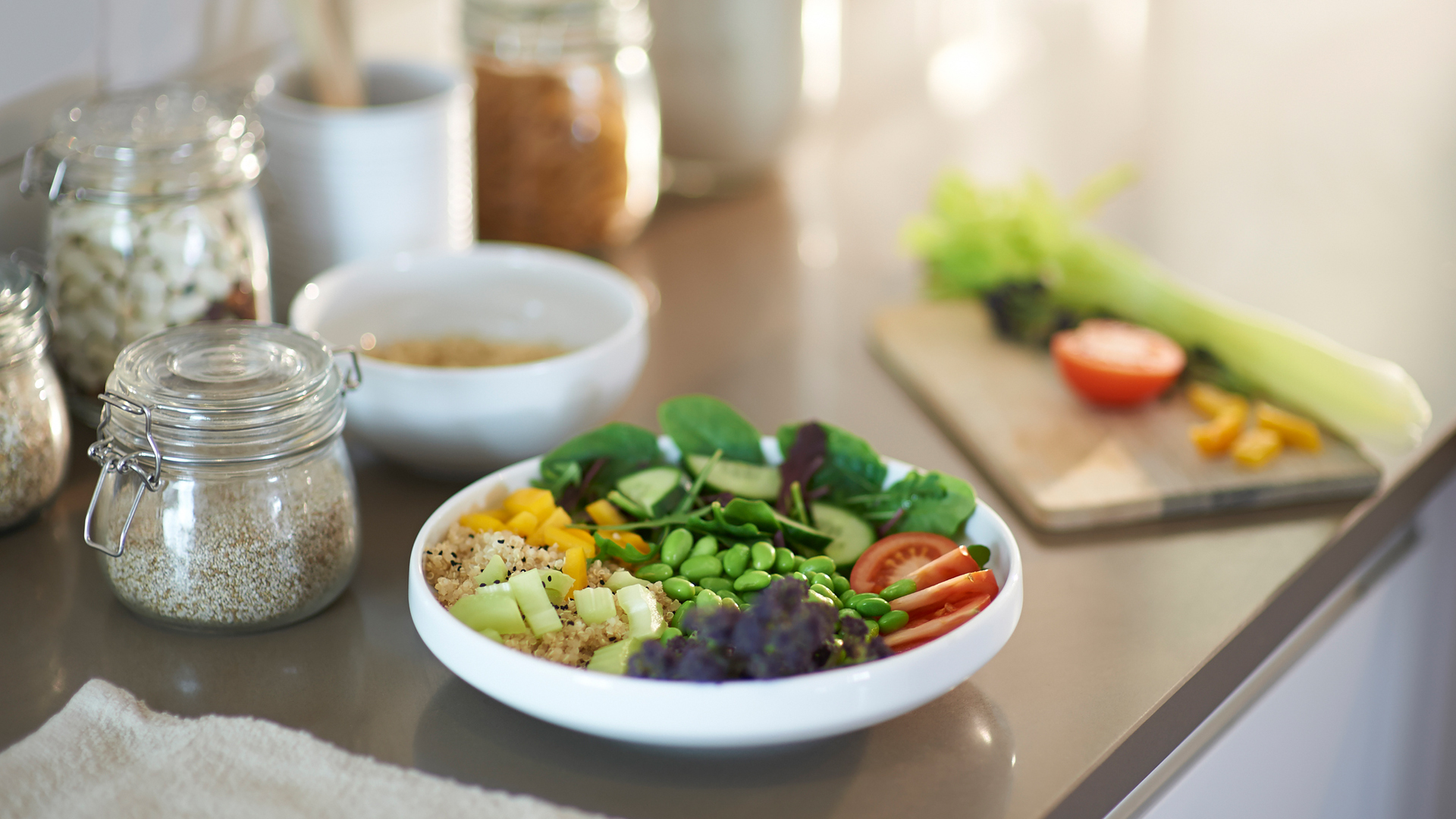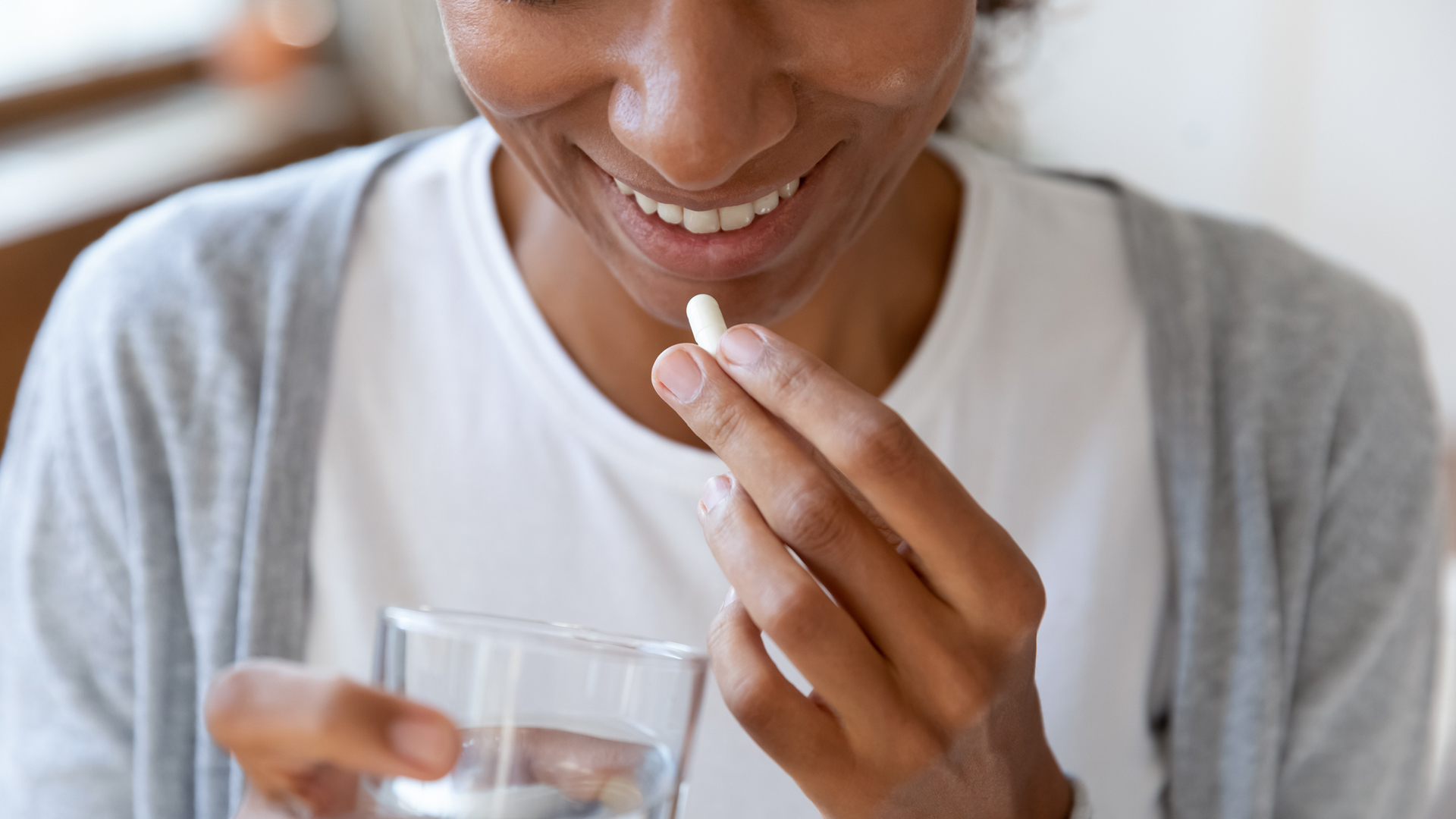Plant-based diet: What to eat, health benefits and tips
Everything you need to know about following a plant-based diet, including risks and deficiencies

Get the world’s most fascinating discoveries delivered straight to your inbox.
You are now subscribed
Your newsletter sign-up was successful
Want to add more newsletters?

Delivered Daily
Daily Newsletter
Sign up for the latest discoveries, groundbreaking research and fascinating breakthroughs that impact you and the wider world direct to your inbox.

Once a week
Life's Little Mysteries
Feed your curiosity with an exclusive mystery every week, solved with science and delivered direct to your inbox before it's seen anywhere else.

Once a week
How It Works
Sign up to our free science & technology newsletter for your weekly fix of fascinating articles, quick quizzes, amazing images, and more

Delivered daily
Space.com Newsletter
Breaking space news, the latest updates on rocket launches, skywatching events and more!

Once a month
Watch This Space
Sign up to our monthly entertainment newsletter to keep up with all our coverage of the latest sci-fi and space movies, tv shows, games and books.

Once a week
Night Sky This Week
Discover this week's must-see night sky events, moon phases, and stunning astrophotos. Sign up for our skywatching newsletter and explore the universe with us!
Join the club
Get full access to premium articles, exclusive features and a growing list of member rewards.
A plant-based diet tends to be made up of nutritious, naturally low-fat, high-fiber foods that are filling and good for the heart, brain and waistline.
While a vegan diet eliminates all animal products, plant-based diets do not. Instead, they focus on eating mostly plants, such as fruits, vegetables, nuts, seeds and wholegrains.
Plant-based diets are increasingly popular, and it’s no wonder when you consider some of the health benefits. A review of studies published in the Journal of geriatric cardiology found that going meat-free could prevent, control and even reverse many chronic illnesses from heart disease, type 2 diabetes and certain cancers.
However people who avoid meat, seafood and dairy products can sometimes be deficient in vitamin B12, which in extreme cases can lead to neurological damage, according to a study published in Neurosciences.
In this article we talk to registered dietitians Nigel Denby and Sophie Medlin to find out more about the plant-based diet, including what to eat, potential health benefits and more.
What is a plant-based diet?
A plant-based diet is based on foods that come from plants with no ingredients derived from animals. This typically includes vegetables, wholegrains, legumes, nuts, seeds and fruits.
This is different to being vegan, which is when you avoid all animal foods and by-products. Strict vegans might also choose to boycott wool, silk, beeswax, leather and fur.
Get the world’s most fascinating discoveries delivered straight to your inbox.
What are the potential benefits of a plant-based diet?
Lower risk of type 2 diabetes and improved kidney function
Consumption of red meat and poultry has been linked to an increased risk of diabetes, in part because of the high volume of heme iron in those meats, according to findings in the Singapore Chinese Health Study.
Reduced arthritic pain
Medlin says: “The evidence here is mixed, as some studies have been able to show reduced levels of inflammation whilst on a plant-based diet. However, the risk of B12 and other micronutrient deficiencies can be higher in vegan and vegetarian diets which can negatively impact arthritis.
“Eating more plants is definitely a good idea with arthritis as they have anti-inflammatory effects in the body. Eating more plants doesn’t have to mean cutting out animal products.”

Sophie Medlin is a consultant dietitian and the Chair for the British Dietetic Association for London, U.K. Sophie has expertise in gastrointestinal and colorectal health. She worked in acute hospitals specialising in gastrointestinal diseases before moving into academia, where she worked as a lecturer at King’s College London.
Keeps your brain sharp
The physiological benefits of following a plant-based diet are many, but there are some possible mental ones too. Boston University School of Medicine researchers found that by eating more plant-based food such as berries and green leafy vegetables, while limiting consumption of foods high in saturated fat and animal products, you could slow down heart failure and ultimately lower your risk of cognitive decline and dementia.
Better heart health
“Plant-based diets typically have a reduced saturated fat and higher unsaturated fat and fiber intake, a winning combination for heart health, which in turn is linked to reducing the risk of cardiovascular disease, obesity and type 2 diabetes,” says Denby.
- Related: Unsaturated vs saturated fat: Which is better for your health?
- Related: How to follow a plant-based diet for weight loss
Lower levels of 'bad' cholesterol
Numerous studies have shown the positive effects of plant-based diets — particularly a vegetarian or vegan diet combined with nuts, soy, and fiber — on cholesterol levels.
“Plant-based diets have been associated with reduced levels of LDL cholesterol, otherwise known as our ‘bad cholesterol’,” says Denby. “LDL cholesterol promotes atherosclerosis, which is the buildup of fatty plaques in our blood vessels. As a result, LDL cholesterol increases the risk of cardiovascular disease. Therefore, reduced LDL cholesterol helps reduce your risk of cardiovascular disease.”
But Medlin warns that not all plant-based diets are created equal. She says: “Plant-based diets tend to be lower in saturated fats, though this isn't always the case — particularly as people increasingly rely on processed plant-based food.”
Improved gut health
Vegetarian and vegan diets have been shown to promote a healthy mix of beneficial bacteria promoting gut and overall health.
A plant-based diet can make it much easier to get your recommended 30g a day of dietary fiber, which will support your gut health.
Denby says: “Your gut is home to numerous bacteria which use fiber, specifically prebiotics, to feed on and produce beneficial short chain fatty acids that support our health, including appetite control.”
Medlin says: “A study published in Frontiers in nutrition found that a plant-based diet may result in a more diverse and stable microbiome but more research is needed in this area. Ideally, a plant-based diet contains many different plants everyday and this is what can improve our microbial health and therefore our gut health.”
Healthy weight
Denby says: “If a plant-based diet is high in fiber, it will also increase satiety since fiber takes time to digest, helping you feel fuller for longer. This may aid some attempting to manage their weight as it may decrease the frequency someone eats, thus reducing energy intake. Some research has shown an association between plant-based diets and reduced BMIs.”
A study in Journal List found that of more than 10,000 people eating different diets, those who followed a plant-based plan had a significantly lower intake of energy, total fat and saturated fat, compared with those who did not.
“Generally, those who follow a vegan diet tend to have lower BMIs than omnivores,” adds Medlin. “But now that we have so much processed vegan food, this BMI difference is likely to become less apparent. Some people gain weight on a vegan diet because they eat a lot more carbohydrate than they did on an omnivorous diet. Others will lose weight on a vegan diet as they will cut out processed meat, pastries and a lot of fast food. We are all different.”

If you’re looking to transition to a more plant-based diet, check out our plant based diet for beginners, as well as our plant-based meal plan.
Plus, whilst research suggests plant-based diets can help to reduce the risk of cardiovascular disease and type 2 diabetes, this depends on the quality of your diet.
“A plant-based diet high in saturated fat will still increase your risk of said health conditions,” explains Denby. “At the end of the day, the nutrients you're taking in still matter — plant or animal based.”
A systematic review published in the Nutrients journal concluded vegetarian and vegan diets reduced blood pressure in comparison with omnivorous diets. These researchers suggested this effect may be linked to a higher fiber and antioxidant intake and lower saturated fat intake on these diets.
What can you eat on a plant-based diet?
According to Medlin, the term 'plant-based' tends to encapsulate plenty of fruit and vegetables, legumes and whole grains. It doesn't mean that you're strictly vegetarian or vegan, so dairy and meat can be consumed.
“We generally think of a plant-based diet as being mostly plants with animal products being a smaller contributor, e.g. a salad with a small amount of chicken or an egg,” says Medlin. “Strict vegetarians do not consume any meat products, and vegans don't consume any product that's derived from an animal.”
“There are no strict rules as the term ‘plant-based’ hasn’t been defined,” says Medlin. “It’s important to remember that sugar is plant-based and chips and other less healthy foods too, so it doesn’t define ‘healthy’. In general it would be recognised that a plant-based diet contains less animal products than a standard diet, although when you look at government guidelines, a ‘normal’ healthy diet is a plant-based diet.”
- Related: 4 types of vegetarian diets
Are there any risks of a plant-based diet?
It’s absolutely possible to get all the correct nutrients on a carefully planned plant-based diet, says Denby.
“However, the risk of micronutrient deficiencies on a plant-based diet occurs when it’s poorly planned,” he says. “When first starting a plant-based diet, you may need to take more time in planning meals to ensure you get all the necessary nutrients.
“If someone isn’t consuming dairy regularly, they should aim to find a milk alternative that’s fortified with calcium, iodine, vitamin D and vitamin B12.
“If someone isn’t keen on oily fish, they can find essential omega-3 fatty acids in walnuts, linseeds or rapeseed oil. Alternatively, a microalgae-based supplement will help ensure good intakes of omega-3.”

According to Denby, to make sure you’re getting enough iron you should include beans, lentils, nuts, dried fruit and iron-fortified breakfast cereals in your diet. Selenium is commonly overlooked too, but just two to three Brazil nuts each day ensures you get all your selenium requirements for the day.
Vitamin B12 is typically found in animal-based foods, such as meat, fish, dairy and eggs. However, plant-based sources include nutritional yeast, yeast spreads and B12 fortified breakfast cereals.
“Someone is more prone to nutrient deficiencies on a plant-based diet if they’re restrictive with the foods they eat and don’t include variety,” says Denby. “Variety ensures you’ll receive a range of nutrients. It’s also important that if you remove a certain food from your diet, such as milk, that you then replace that with a food containing similar nutrients, such as fortified dairy alternatives.”
This article is for informational purposes only and is not meant to offer medical advice.

Maddy Biddulph is a freelance health and fitness journalist with over 26 years of experience working for consumer media in the US and UK. As a Level 3 personal trainer and weight loss advisor she is used to trying out and reviewing the latest health and fitness products. At Maddy Biddulph Personal Training, she runs one-to-one and small group sessions, as well as group exercise classes. She specializes in mobility work with seniors and runs regular chair workouts in her hometown of Oxford.
 Live Science Plus
Live Science Plus










